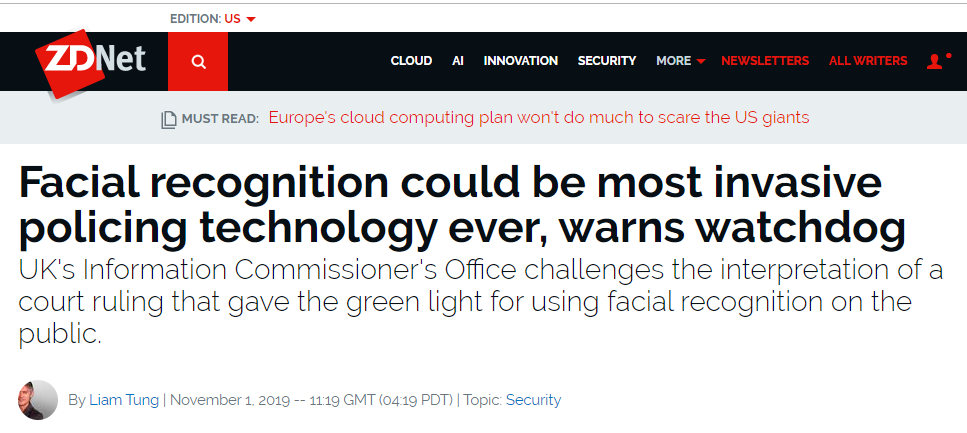Nearly 90 organizations and experts from 30 countries are calling for a moratorium on further deployment of facial recognition technology.
In making a public declaration, the group says that the tech has evolved from a collection of niche systems to a “powerful integrated network capable of mass surveillance and political control.”
“Unlike other forms of biometric technology, facial recognition is capable of scrutinizing entire urban areas, capturing the identities of tens or hundreds of thousands of people at any one time,” the group declared.
They cite growing protests around the world and legal action underway, such as the state of California, which has banned the use of facial recognition on police body camera and Sweden’s prohibition of facial recognition use in schools.
In Hong Kong recently, protestors took to the streets and knocked down a tower they believed hosted facial recognition tech.
Hong Kong protesters knocking down a facial recognition tower. They’re setting a strong precedent for how to deal with authoritarian governments (China) and practices (facial recognition). pic.twitter.com/ZS1pmDSZDJ
— mahsa alimardani 🌒 (@maasalan) August 25, 2019
In the UK, the Information Commissioner’s office has challenged court rulings allowing facial recognition by police.

In the U.S., the ACLU has sued the Justice Department, the Drug Enforcement Administration, and the FBI for records detailing their use of the technology. In the complaint, they argue that the agencies have secretly implemented a “nationwide surveillance technology” that threatens privacy and civil rights. Read the ACLU filing here.
Meanwhile, the U.S. government is increasing its use of facial recognition at airports. Sen. Ed Markey (D-Mass) has called on TSA to stop deployment of facial recognition technology until polices are in place.
Today, I pressed TSA to commit that Americans will never be forced to share their biometric data, that facial recognition tech won’t harm members of particular races, and that your sensitive data will be kept secure. pic.twitter.com/SkzsmxsfQ6
— Ed Markey (@SenMarkey) September 11, 2019
Several U.S. cities are considering bans, including Springfield, Massachusetts.
Here is what the consortium is asking for:
- We urge countries to suspend the further deployment of facial recognition technology for mass surveillance;
- We urge countries to review all facial recognition systems to determine whether personal data was obtained lawfully and to destroy data that was obtained unlawfully;
- We urge countries to undertake research to assess bias, privacy and data protection, risk, and cyber vulnerability, as well as the ethical, legal, and social implications associated with the deployment of facial recognition technologies; and
- We urge countries to establish the legal rules, technical standards, and ethical guidelines necessary to safeguard fundamental rights and comply with legal obligations before further deployment of this technology occurs.
